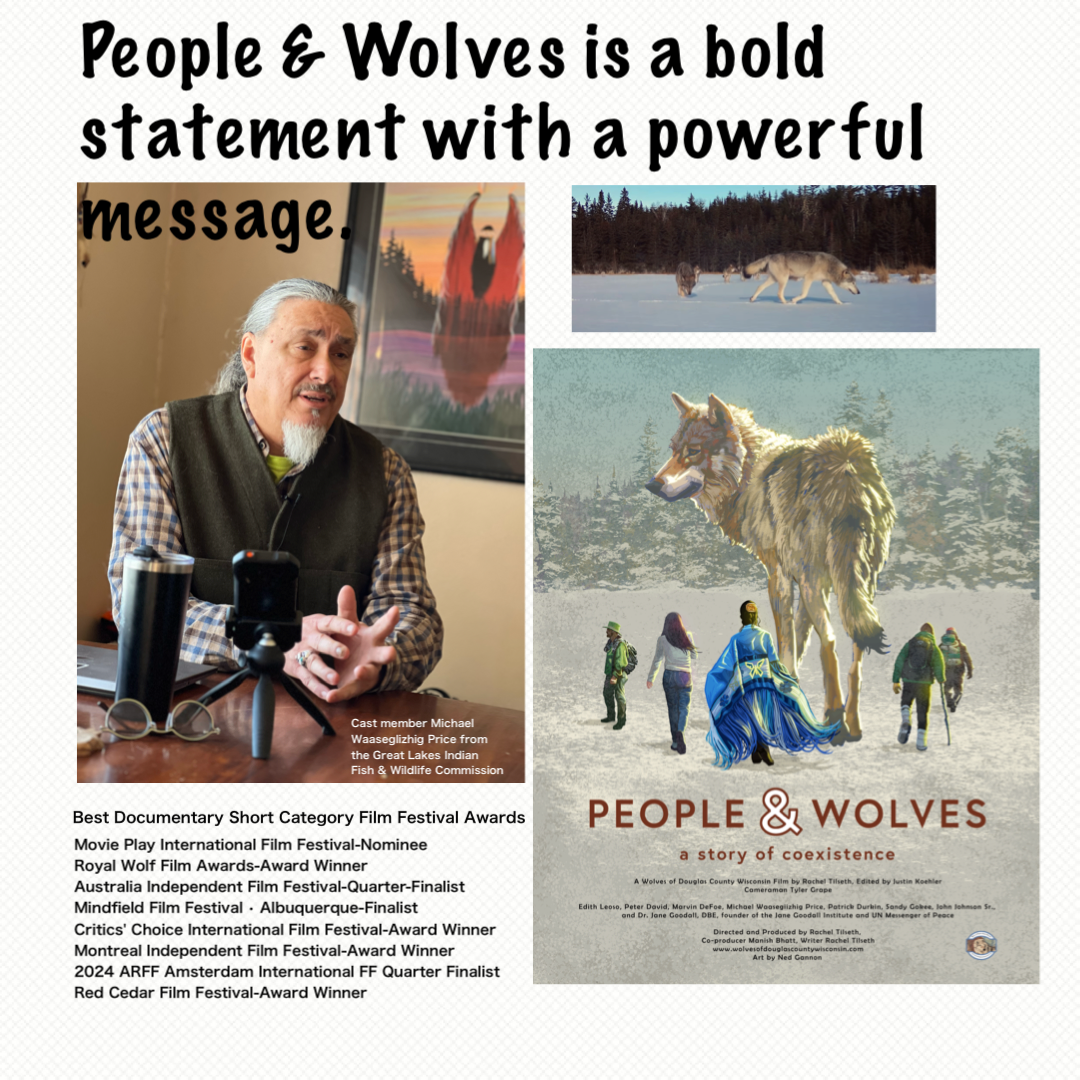People & Wolves: A Story of Coexistence

Description
For centuries, the Ojibwe have lived alongside their brother Ma’iingan, who we know in English to be the wolf. In February 2021, a brutal assault, a hunt on their wolf relative, stirs emotion and grief for Ma’iingan as they know what happens to him will happen to them.
Gray wolves recolonized parts of Wisconsin in the 1970s, after being killed off in the state in the 1950s, and grew to a population of over 1000 wolves by 2020. Unfortunately this conservation success story has become very controversial in the last decade. Federal and state endangered species acts have helped recover wolves in the state, but four attempts by the federal government to delist wolves from the Endangered Species Act (ESA) have resulted in court challenges returning wolves to the endangered list. After federal delisting in 2012, the Wisconsin legislature mandated that wolf hunts would be required whenever gray wolves were off the ESA list.
The most recent delisting battle started in January 2021, leading to a court-ordered three-day controversial wolf hunt during the breeding season in February. It went over the allotted quota, angering many Wisconsinites. The Wisconsin Department of Natural Resources (WDNR) began work on a new state Wolf Management Plan that was last completed in 1999. The DNR formed a committee of stakeholders, including the tribes.
Ojibwe bands in Red Cliff and Bad River have their own Ma’iingan (Wolf) Relationship Plans. The state must work with the tribes on wolf management, including any wolf hunting seasons. Political battles began over how to manage the next hunt in November 2021. The struggle between the DNR, its Natural Resources Board, and pro-wolf advocates ended with several lawsuits and one that yielded an injunction to stop the November 2021 wolf hunt. The six Ojibwe tribes also sued and claimed the wolf hunt violated their treaty rights. A year after the controversial wolf hunt, a California judge ordered gray wolves in much of the lower 48 states back on the ESA on February 18, 2022. Though gray wolves have numerically recovered in Wisconsin, the future of wolf management remains in limbo in the state.
Meet the People
Edith Leoso is a Bad River Tribal member, retired from working as the Bad River Tribal Historic Preservation Officer (THPO) for the past 18 years. She is a discussant and presenter on a local, regional, national, and international level on a variety of issues related to Bad River Tribal History, inherent practices (culture), Traditional Ecological Knowledge (TEK), Tribal perspectives of climate change, Tribal Historic Preservation, historical trauma, and the Native American Graves Protection and Repatriation Act (NAGPRA). Edith has assisted countless others, locally, statewide, nationally, and internationally, with Ph.D. dissertations, research, articles, books, and other published and unpublished works. She is featured in several films, documentaries, and books and has provided radio interviews, including All Things Considered on NPR. Films include Stewards of All Creation by Midwest Environmental Justice Network – Windward Fund 2020.
Marvin DeFoe a contributing author of the Ma’iingan Relationship Plan and member of the Red Cliff Band of Lake Superior Chippewa. He is an educator, teacher, birch bark canoe builder, and Red Cliff elder. He grew up in the Red Cliff community and is part of the sturgeon clan. Named Shingway Banase in Anishinaabe, he is passionate about maintenance and revitalization of the Ojibwe language. Marvin is past Vice Chair on the tribal council and has been the Tribal Historic Preservation Officer for four years.
Peter David is a retired wildlife biologist with the Great Lakes Indian Fish and Wildlife Commission, where he assists GLIFWC’s member tribes in the implementation of their off-reservation, treaty-reserved rights. He received his education (bachelors and masters in Wildlife Ecology) from UW-Madison, and from the tribal elders and members for whom he has worked for the last 35 years. At the Commission, he has had the opportunity to steward resources as varied as wild rice and wolves.
Dr. Jane Goodall, DBE, Founder of the Jane Goodall Institute & UN Messenger of Peace. Equipped with little more than a notebook, binoculars, and her fascination with wildlife, Jane Goodall braved a realm of unknowns to give the world a remarkable window into humankind’s closest living relatives. Through nearly 60 years of groundbreaking work, Dr. Jane Goodall has not only shown us the urgent need to protect chimpanzees from extinction; she has also redefined species conservation to include the needs of local people and the environment. Today she travels the world, speaking about the threats facing chimpanzees and environmental crises, urging each of us to take action on behalf of all living things and the planet we share.
Patrick Durkin of Eau Claire, Wisconsin, is an award-winning outdoor writer, newspaper columnist, and general outdoors reporter. He has been MeatEater’s wildlife research contributor since June 2018 and frequently writes for national archery and hunting magazines. Durkin also provides editing services for books and magazines and was a contributing editor/writer for the Archery Trade Association from September 2001 through January 2021.
Michael Waasegiizhig Price is the Traditional Ecological Knowledge Specialist at the Great Lakes Indian Fish and Wildlife Commission in Odanah, WI. He is Anishinaabe, an enrolled member of Wikwemikong First Nations, Canada. His role as a TEK Specialist involves integrating the Anishinaabe language, cultural perspectives, and ceremonies into research methods and resource management to make science more culturally relevant. Michael received his Master of Science in Forestry from the University of Montana and a Bachelor of Arts in Biology from Benedictine College in Atchison, KS. He also received his Certificate of Ojibwe Language Instruction from Bemidji State University.
Meet the Filmmakers
 Rachel Tilseth – Producer & Director
Rachel Tilseth – Producer & Director
Rachel Tilseth is an art educator, freelance writer, filmmaker, and retired DNR volunteer Winter Wolf Tracker. She has a Bachelor of Science Degree in Art Education in 1992 from UW-Stout, graduating with cum laude honors. She became a Wisconsin Department of Natural Resources Volunteer Winter Wolf/Carnivore Tracker in the year 2000 and, as a result, learned about the lives of wild gray wolves. As the film’s producer, Rachel brings her knowledge of Wisconsin’s wolves & the politics surrounding them.
Rachel Tilseth’s documentarian work is a testament to her dedication to environmental and cultural education. Through her short films, she gives a voice to the Indigenous people and the majestic wolves they revere. Her craftsmanship is commendable, from the high technical standards of ‘People & Wolves’ to the heartfelt narrative of ‘More than a Wolf: Wolf 813’. Tilseth’s films are not just documentaries; they are emotional journeys that challenge viewers to empathize with the plight of both wolves and the Indigenous communities that cherish them.
In an era where conservation is more critical than ever, Rachel Tilseth stands out as a passionate filmmaker with a strong, unwavering voice. Her ability to bring various perspectives together to advocate for wolves is admirable and inspiring. Her films are essential viewing for anyone who cares about the delicate balance between humans and nature. Through her exceptional work, Tilseth continues to educate, inspire, and move audiences worldwide.
 Manish Bhatt – Co-Producer
Manish Bhatt – Co-Producer
Manish Bhatt is a conservationist, writer, lawyer, and education leader. He holds a Bachelors of Arts magna cum laude from The George Washington University, a Juris Doctor magna cum laude from St. Thomas University School of Law and a LL.M. from Georgetown University Law Center.
Having grown up in a rural community in New York’s Catskill Mountains, Manish has a lifelong commitment to preserving wild spaces and wildlife. As an officer and Judge Advocate in the United States Coast Guard, Manish deployed in support of cleanup efforts following the Deepwater Horizon Oil Spill and led section 7 consultations with federal agency partners under the Endangered Species Act. He also worked closely with the Environmental Protection Agency and State Historic Preservation Officers to ensure compliance with marine environmental laws and regulations. Manish has served as a teacher and Head of School and believes in experiential and outdoor education. As a school leader, he worked closely with fundraising partners and grant providers to ensure student success and curricular development.
Manish is a feature and investigative writer for the Wolves of Douglas County Wisconsin Films. To each article he brings deep curiosity and commitment to objectivity. As a lifelong learner, Manish seeks data and trend analysis as a part of his reporting, in addition to interviewing experts in the field of wolf biology. Manish has co-hosted, alongside Rachel Tilselth, WORT Radio’s Access Hour to share wolf science and information with the listening audience.
Visit our website at: www.wolvesofdouglascountywisconsin.com
